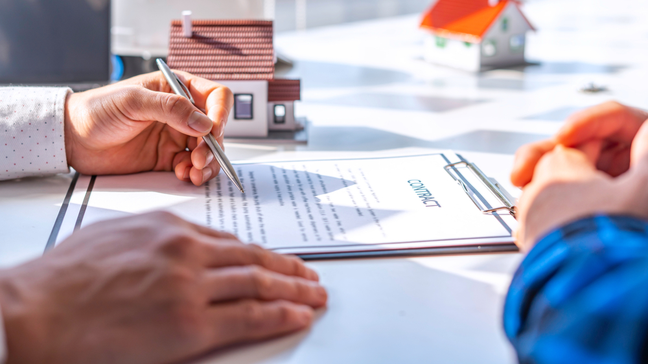Whenever the decision is about money, there is a lot of pressure. Buying a home is no exception – it’s a stressful process, especially since there are many moving parts and significant financial implications if you make a mistake.
To help you overcome the hurdles and potentially save some serious money, I’ve highlighted nine common mistakes to avoid when buying your future modest home.
1. Underestimating Closing Costs and Home Ownership Costs
You have checked your credit report and received pre-approval for a mortgage. You have explored different areas and found a reasonably priced home that suits your preferences and needs. You have even come to an agreement on a price that is within your budget. Finally, you are ready to sign the dotted line and become a homeowner. Not so fast.
The purchase price is far from the final amount you have to pay. Unfortunately for many people’s wallets, the money sucking doesn’t stop there – you’re still getting hooked on various closing costs.
After the loan agreement is concluded, you will receive a document called a “Good Faith Estimate” that lists your closing costs. You may have attorney fees, property appraisal fees, homeowners association transfer fees, home inspection fees (which, again, are worth it), property taxes, and so on. While closing costs are negotiable, the buyer is generally responsible for most of them.
The cost of homeownership is just getting started. In addition to the monthly loan payment, you should also consider:
- Utilities.
- Renovation (especially if it is an old house).
- Possible improvements.
- PMI.
- Homeowners insurance (which is separate from PMI and required by lenders).
- Taxes.
When you’re setting your budget for buying a home, don’t neglect these additional and ongoing expenses.
2. Hurry up to buy a house

Many first time homebuyers adopt an urgent mentality. They think they need to move fast, a feeling that intensifies when the housing market is hot. This can lead to fear of missing out (FOMO) and spontaneous decisions.
Given the scale of this purchase, it would be huge error.
Buying a home is not a sprint, it’s a marathon.
Cutting corners will get you into trouble. You’ll miss red flags, go over your budget, and possibly buy the wrong house.
To make sure you buy right home, take a deliberate and meticulous approach. Describe your preferences, such as proximity to schools or number of bathrooms. Explore several houses in several areas. Go through each area to see if you can imagine yourself there.
These simple steps will save you the hassle.
Read more: A guide to buying a home for the first time
3. Finding a Home Before Mortgage Approval
You diligently explored the various areas, looking for exactly what you need. You fell in love with your future home. You can imagine waking up, walking up the stairs, brewing a fresh cup of joe, and lounging in your backyard as the birds chirp above you.
Except for the sad reality: you can’t afford this dream.
You’ve been shopping with no practical idea of how much you can afford. Now you are disappointed.
This is the risk you take when looking for a home before you apply for a mortgage.
You will most likely need the help of a lender to buy a home, so it’s worth trying to pre-qualify or pre-approved. You will learn your purchasing power, which will help you get rid of houses that are not in your budget.
4. Applying for a Mortgage Before Your Credit Review

To maximize your chances of getting a mortgage, make sure your credit report is error-free and your credit score is above the minimum threshold. Otherwise, you may delay the process or receive more interest than necessary.
You can use AnnualCreditReport.com access your credit report free – you don’t even need to provide your credit card details. (Although you will need to provide your name, address, and social security number.)
The minimum credit score required to qualify for a mortgage depends on your lender and loan program. For conventional loans, the lowest score can be between 620 and 660. If your credit score is below this range, give preference improve your score before you start looking at mortgages. This is not only financially sound, but it also saves time.
Read more: How to improve your credit score step by step
5. Stick to your first lender
Just like looking at multiple homes can save you money, comparing lenders and rates can keep you from overspending on your mortgage.
I know apps are time consuming and dealing with multiple banks can be a hassle, but buying rates is worth it. Because home prices are so high (compared to all other regular purchases), every percentage drop counts, whether it’s closing costs or the interest rate. Imagine if you reduced your interest payments by $100 a month on a 30-year mortgage – that’s a $36,000 difference.
Would you buy the first car you saw at a dealership? Treat a mortgage like buying a car: compare lenders and their rates to save money.
Read more: Best Mortgage Rates – Mortgage Rates Updated Daily
6. Ignorance about credit programs

If you are new to the process, you may not be aware of some programs that can help you qualify for a mortgage without a flashy credit history or a large down payment.
For example, here are some common mortgage options:
- If you are a member of the military community, you may be eligible for a home loan backed by the U.S. Department of Veterans Affairs (known as VA loan).
- The Federal Housing Administration (FHA) also insures loans. You can apply for FHA loan with a credit score of 500 if you make a 10% down payment or 580 if you make a 3.5% down payment.
- If you want to buy a house in the countryside, you can apply for credit in US dollars, which is insured by the USDA. Generally, the USDA requires a minimum score of 580.
Once you’ve identified a lender, ask them about potential programs for first-time homebuyers. You never know until you ask.
Read more: Government Programs for First Time Homebuyers: What First Time Buyers Need to Know
7. Underestimating your down payment
Depending on your financial situation, your lender may require you to make as little as a 3.5% down payment on your home purchase. Under some loan programsyou may not need to record anything at all. However, meeting the minimum does not necessarily maximize your savings.
If you can afford a higher down payment (without sacrificing your liquidity), you can cut your monthly expenses significantly, including private mortgage insurance (PMI) and interest payments on the loan. In turn, less of a burden on your monthly income.
For example, let’s say you want to get a $350,000 regular 30-year mortgage but don’t want to make a down payment. You will have to pay a monthly fee for PMI because your down payment is less than 20%.
With a PMI estimate of 0.5%, that’s an extra $145 out of your wallet. each month.
Also, since your principal balance is higher, your monthly interest expense is also higher. Assuming an interest rate of 3%, your monthly loan payment will be $1,475 if you don’t make a down payment.
Conversely, if you made a down payment of 20%, that obligation would drop to $1,180—$295 less per month.
this is another $106,200 for 30 years. If you can manage a higher down payment, it’s worth the investment.
Want to know how much you can save? Check out our Mortgage Calculator.
8. Spend your savings to afford a new home

Buying a house is a big purchase, but it’s not a big or going home purchase (pun on 100%). Home is not a new pair of shoes where you can afford to splurge a little here and there. Make sure your home doesn’t drain your current savings or limit your future income.
For example, if buying a certain house requires you to spend your emergency fund, you know you’re deviating from your financial path. Or, if your mortgage payments are putting an undue burden on your monthly income to the point where you are struggling to survive, you might be better off looking for a cheaper home.
There is nothing wrong with lowering your expectations if it means maintaining financial stability.
9. Skip inspection to save money or time
Have you ever heard the phrase: “Everything shines, but there is no substance?”
Well, some houses can look absolutely amazing but be rotten on the inside.
Even if you’re focused on a particular property, it’s worth knowing what’s under the floorboards and behind the walls. Don’t skip home inspections to save time – this would directly contradict the mentality of not rushing the process.
Otherwise, you risk buying a home with thousands of dollars worth of hidden damage. This is a financially crippling problem.
Resources for First Time Buyers
The goal is to help you avoid the same mistakes many homebuyers make, so I’ve put together a list of resources for you below!
Summary
If this is your first time buying a home, you may be nervous about such a big decision. Just don’t let those nerves turn into emotional decisions. Stay calm, take your time, and—for the sake of your bank account—make conservative assumptions about your budget.
If you take these precautions ahead of time, you will protect yourself from costly mistakes.


